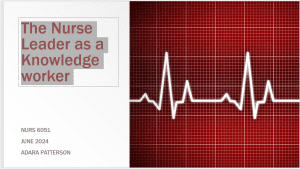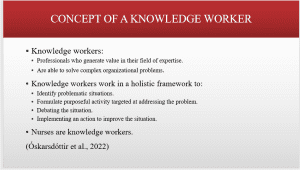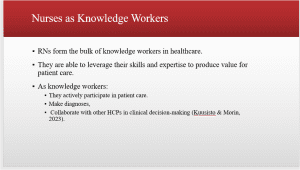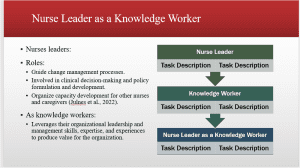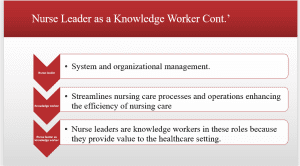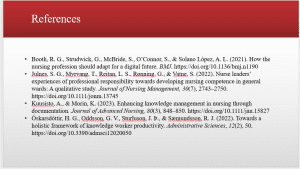The Nurse Leader as a Knowledge worker
Hello and welcome to this PowerPoint presentation. In this presentation, we will discuss the evolution of nursing and how nurses assume the role of knowledge workers.
Knowledge workers are professionals who generate value in their field of expertise with their interpersonal skills, expertise, and critical thinking. Óskarsdóttir et al. (2022) note that knowledge workers are highly skilled, highly educated, and highly paid professionals who can solve complex organizational problems or develop new services or products for the organization by leveraging their skills. They are often highly educated and work in a holistic framework to identify problematic situations, formulate purposeful activity targeted at addressing the problem, debate the situation, and implement an action to improve the situation (Óskarsdóttir et al., 2022). Initially thought to be a preserve for the few, the number of knowledge workers has grown tremendously in workspaces. In the healthcare landscape, registered nurses are perhaps the largest group of knowledge workers. Others include pharmacists, physicians, and laboratory technologists, among others.
Registered nurses form the bulk of knowledge workers in healthcare. Their ability to utilize their nursing skills, experiences, and expertise to produce value to patient care and the overall healthcare landscape makes them knowledge workers. As knowledge workers, nurses actively participate in patient care. They make nursing diagnoses, recommend care plans to physicians, and collaborate with other healthcare professionals in clinical decision-making processes (Kuusisto & Morin, 2023). In an ever-evolving healthcare landscape, nurses are expected to maintain their competency in patient care by continuously updating their knowledge base on diverse aspects of healthcare. This affirms their position as knowledge workers in healthcare.
Nursing informatics is the practice of integrating nursing information, expertise, and knowledge with technology to identify, define, and communicate data and nursing knowledge and wisdom. As technology experts in healthcare, nurse informaticists are not only involved in health technology innovations but also implement new systems, software, patient data management, and the translation of valuable health data and healthcare technologies into patient care (Booth et al., 2021). They also educate nurses on the effective use of available technologies. In the hypothetical scenario presented, nurse informaticists may be involved in educating the nurses on the effective use of health information technologies such as EMR and how they can play a role in ensuring safety and security safeguards on the software. In this respect, logging out is a mandatory process for all caregivers using the software as it guarantees safety safeguards.
Nurse leaders are also knowledge workers. Nurse leaders leverage their organizational leadership and management skills, as well as their expertise and experiences to produce value for the organization. In this respect, they are involved in change management processes, clinical decision-making, and policy formulation and development. They also organize capacity development for other nurses and caregivers (Julnes et al., 2022). the excellence of nurse leaders in their roles is directly reflected in the patient care outcomes. Through effective systems planning and development, nurse leaders can ensure effectiveness in nursing care, translating into accurate diagnoses, error minimization, and consequently improved health and clinical outcomes.
This is a visual presentation of the role of a nurse leader as a knowledge worker. Nurse leaders play a role in systems and organizational management. As system and organizational managers, they work with other healthcare leaders to streamline nursing operations within the care environment. These roles make nurse leaders knowledge workers as they translate to value addition within the healthcare environment. By streamlining care processes and nursing operations, nurse leaders can enhance nursing care efficiencies, improving health and clinical outcomes.
You are currently in the medication room. You are retrieving the medication for one of your two patients. Both of your patients are on cardiac drips, but only one requires immediate replacement. Therefore, you must retrieve the necessary drugs from Omnicell. Patient A is taking intravenous dobutamine and requires a new bag before the current infusion runs out. A different nurse enters the medicine room to notify you that the alarm on the pump in room A is sounding. You instinctively seize the medication as soon as the door to it opens, without hesitation. Ultimately, you are aware of the precise location of the medications, and you observe the presence of the “do” for dobutamine, which is the medication you currently require due to the worrisome state of the pump. You retrieve the medication and securely shut the door before officially logging out. Upon entering the room, you scan the patient’s arm band and proceed to access the medication tab in the record. After locating it, you retrieve the medication list and proceed to scan the medication. When attempting to scan the drug, an error message appears, indicating that the medication is not currently scheduled for administration. The medication is not found in the Medication Administration Record (MAR). Upon examination of the drug, you discover that you mistakenly picked up dopamine instead of dobutamine. You briefly halt, acknowledging the horrible mistake you have committed. You return to the medication room to relinquish the drug and retrieve the appropriate one.
ORDER A PLAGIARISM-FREE PAPER HERE
We’ll write everything from scratch
Question
This is a PowerPoint presentation, 5-6 slides, the main 4 slides need to answer the
bullet point questions. I have also added my scenario at the end that I used in my weekly discussion. I can add on anything needed.

The Nurse Leader as a Knowledge worker
To Prepare:
Review the concepts of informatics as presented in the Resources.
Reflect on the role of a nurse leader as a knowledge worker.
Consider how knowledge may be informed by data that is collected/accessed.
The Assignment:
Explain the concept of a knowledge worker.
Define and explain nursing informatics and highlight the role of a nurse leader as a knowledge worker.
Include one slide that visually represents the role of a nurse leader as a knowledge worker.
Your PowerPoint should Include the hypothetical scenario you originally shared in the Discussion Forum. Include your examination of the data that you could use, how the data might be accessed/collected, and what knowledge might be derived from that data. Be sure to incorporate feedback received from your colleagues’ responses.

